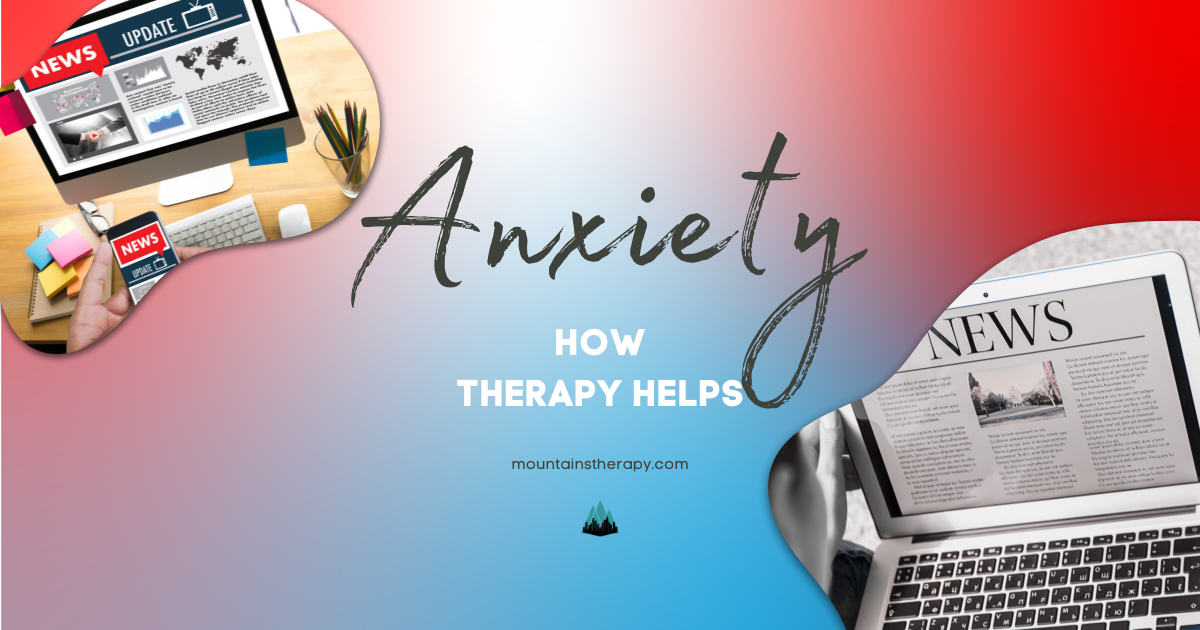Anxiety: Thinking Patterns, Types, and How Therapy Helps
Learn more about Anxiety Therapy.
In This Blog, You’ll Learn:
✅ What anxiety really is and the most common types
✅ How negative thought patterns increase anxiety
✅ Myths vs. facts about anxiety and why it’s often misunderstood
✅ Tools to help you manage and reduce anxiety symptoms
✅ How therapy supports anxiety relief, political stress, and emotional burnout
✅ How to handle political anxiety, including Trump anxiety
✅ The impact of social media detoxification on mental health
What Is Anxiety and Why Does It Matter?
Anxiety is more than just stress. It’s a pattern of physical and emotional symptoms that affect your ability to feel calm, focused, or connected. At Mountains Therapy in Montclair, NJ, we help clients understand how anxiety shows up in their bodies and thoughts—and how to break free from its grip.
Trump Anxiety and Political Stress
If you’ve ever searched how to stop worrying about Trump, how to cope with Trump presidency, or how to stay sane during Trump presidency. YOU ARE NOTE ALONE! Trump anxiety is the intense political stress or dread triggered by past, current, or future elections.
Common symptoms include:
- Doomscrolling and panic after watching the news
- Fearing loss of rights or safety
- Arguing with family over politics
- Feeling emotionally exhausted and powerless
- Therapy can help you explore how to deal with Trump, how to deal with Trump presidency, and how to cope with Trump-related overwhelm.
Try setting boundaries around political media, choosing 1–2 trusted news sources, and practicing social media detoxification or detox from social media when needed. Deleting social media temporarily or permanently is also a valid mental health decision.
Other Types of Anxiety
There are many different expressions of anxiety. These include:
- Generalized Anxiety Disorder (GAD)
- Social Anxiety Disorder
- Panic Disorder
- Obsessive-Compulsive Disorder (OCD)
- Health Anxiety
- Phobias
- Post-Traumatic Stress Disorder (PTSD)
How Anxiety Affects Your Thoughts
When you’re dealing with anxiety, it’s not just your body that’s on edge it’s your mind too. People with anxiety often develop distorted ways of thinking that heighten fear, uncertainty, and self-doubt. These patterns are known as cognitive distortions, and while they’re incredibly common, they’re also manageable with support.
Here are some of the most common thinking patterns we work through in therapy:
- Catastrophizing: “If this goes wrong, everything will fall apart.”
- Mind Reading: “They think I’m annoying. I just know it.”
- Fortune Telling: “Something bad is going to happen. I can feel it.”
- All-or-Nothing Thinking: “If I’m not perfect, I’ve failed.”
- Should Statements: “I should be handling this better.”
- Labeling: “I’m so stupid for making that mistake.”
- Overgeneralizing: “I always mess things up. I never get it right.”
- Personalization: “This is probably my fault.”
- Emotional Reasoning: “I feel anxious, so something must be wrong.”
- Mental Filtering: “Nothing is going well—everything is terrible.”
- Disqualifying the Positive: “That success doesn’t count—it was a fluke.”
- Magnification: “That mistake I made is going to ruin everything.”
- Minimization: “That accomplishment wasn’t a big deal.”
Therapy helps you identify these cognitive distortions, challenge them, and replace them with more balanced, empowering thoughts. At Mountains Therapy in Montclair, NJ, NC, FL & UT, we give you the tools to step out of the anxiety spiral and into a calmer, more grounded version of yourself.
Real-Life Political Anxiety Thought Patterns
We’re hearing more and more clients say things like:
💬 “Every time I read the news, I feel sick.”
💬 “What if my rights or safety are taken away again?”
💬 “I’m bracing for another political disaster.”
💬 “I don’t feel safe in my own country.”
💬 “I’m scared and don’t know who to trust.”
This is Trump anxiety, and it’s valid. Therapy can help you stay informed without staying overwhelmed.
Myths and Facts About Anxiety
Myth: You should avoid everything that makes you anxious.
✅ Fact: Avoidance fuels anxiety. Therapy helps you face fear safely.
Myth: Anxiety means you're weak.
✅ Fact: Anxiety is a protective response. Your body trying to keep you safe.
Myth: You just need to relax.
✅ Fact: Coping skills help, but anxiety often needs deeper healing.
How to Cope with Anxiety
✅ Deep breathing and grounding
✅ Limit exposure to news and toxic social media
✅ Try a social media detoxification or even deleting social media
✅ Move your body—walk, stretch, shake off tension
✅ Write instead of ruminate
✅ Talk to a therapist near me to process and heal
How Therapy Helps with Anxiety
At Mountains Therapy, we help you manage anxiety with evidence-based care. We help clients build custom anxiety treatment plans to restore calm, reduce reactivity, and improve resilience. We off
✔️
CBT for anxiety
✔️
ACT therapy for political stress
✔️
Psychodynamic therapy for deep emotional work
✔️
Support for anxious attachment
✔️
PTSD therapist near me for unresolved fear
✔️
Individual Therapy for Trump anxiety
Anxiety doesn’t make you broken. It makes you human. Whether it’s political tension, relationship stress, or overthinking everything, you’re allowed to ask for help. Reach ou to Mountains Therapy in Montclair, NJ today to connect with a therapist who understands what you're carrying and can help you find relief.














